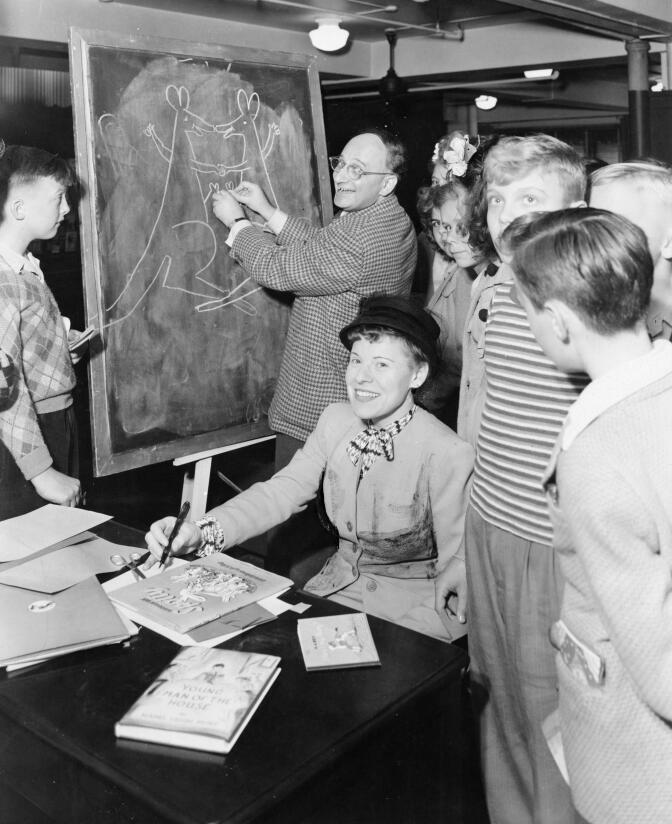Curious George famously managed all sorts of escapes — from policemen, firemen, zookeepers and plenty other humans who didn't like his mischief. But many readers don't know that the husband-wife team who created the inquisitive little monkey — who is celebrating his 75th birthday this year — had the most harrowing escape of all.
In 1939, artists Hans Augusto and Margret Rey were living in Paris, where they had written a book with a side character named Fifi. The Reys thought this young, inquisitive monkey deserved his own story and wrote a manuscript for The Adventures of Fifi.

But their plans were interrupted when the Nazis invaded France. As German-born Jews, the Reys had to get out of Paris, but the trains had stopped running and they didn't own a car. So Hans went to a bike shop — and found the only bike left was a tandem.
"Margret would have none of it," says Louise Borden, author of The Journey that Saved Curious George. "So Hans bought spare parts and assembled two bicycles."
The couple packed what could fit on their backs and fled for their lives on their hastily assembled bicycles. They rode for three days, sometimes sleeping outside. Eventually they were able to get on a train.
In her book, Borden recounts how, mid-escape, the Reys were stopped for questioning by a French official. Hans opened his satchel and showed him the manuscript about the curious monkey: "Ah! ... un livre pour les enfants!" he exclaimed with a smile.
The Reys made their way out of France, and then to Spain, Portugal, Brazil and eventually, New York City. Through an editor they had met in Europe, they signed a deal with publisher Houghton Mifflin. A year later, Curious George (who by now had swapped his French name for an American one) made his debut.

You can tell George's story was written a long time ago. At the outset, we are told George lives "in Africa," where he meets the Man with the Yellow Hat, who thinks to himself, "What a nice little monkey ... I would like to take him home with me." So the man — who has a gun slung over his shoulder — pops George into a bag, onto a ship, and sails across the ocean where he keeps George in his apartment in the city.
That the books are a product of the time hasn't stopped George from becoming a global icon, selling some 75 million books in more than 16 languages. The Reys wrote seven Curious George books — he takes a job, flies a kite, rides a bike, goes to the hospital, learns the alphabet and more.
Margret wrote the text of George's escapades and Hans illustrated them. Hans, who had been a soldier in the German army during World War I, was considerably older than Margret. "I did better with my pencil than with my rifle," he said. They both loved animals and trips to the zoo but had different temperaments — she was a rebel, he was a dreamer; he had a Pied Piper quality to him, while she didn't feel a strong connection to children.
"Hans was the quieter one," says Borden. "He loved philosophy. He was a linguist. Margret was a woman with sparkle and energy and she always spoke her own mind."
In 1991, Margret Rey told NPR that she and her husband had no idea what Curious George would become. "We loved monkeys and just wrote a book about a monkey," she said.
After Hans died in 1977, Margret left the Curious George brand in the hands of their publisher. That's where Curious George's big second act — as a multimillion-dollar franchise — began.
Today, George's keepers include PBS, Universal Studios and Houghton Mifflin, where a staff of about 15 people work on new George books.
Part of George's enduring appeal is that he remains a monkey, says Houghton Mifflin's Mary Wilcox — which was important to the Reys.
"Sometimes there can be a temptation to treat him as though he is like a human character," Wilcox explains. "Because many illustrated characters actually are. Mickey Mouse isn't a rodent — he's actually a person in a mouse suit so he can drive a car, he can have a conversation. So I think I'm being most respectful of their legacy when I'm saying: Nope, George doesn't talk."
A lot of George's current success also rests on Frank Welker, who, for 10 years, has been voicing George on-screen. (Welker is also the voice of the evil Megatron in Transformers, so George, he says, is a "pure delight.")
Welker says Curious George is an example of "a sweet, gentle story" coming out of a "very troubled time."
Ema Ryan Yamazaki, who is making a documentary about the Reys, grew up in Japan, reading Curious George in Japanese. "I love that little monkey," she says.
But George has an army of people taking care of him, and Yamazaki felt his creators' story needed to be told. The filmmaker feels a certain responsibility to get it right — after all, Margret Rey would insist on it.
"She really took it upon herself to continue Curious George as their child and joint creation, to make sure he outlived both of them," Yamazaki says.

There's no question that George lives on — today he's the star of a movie, an Emmy Award-winning TV series, a website, video games and, of course, many books.
Margret Rey once said, "We did only what we liked and by nice coincidence, the children liked the same thing."
Nice coincidence indeed.
Beth Novey contributed to this story.
Copyright 2022 NPR. To see more, visit https://www.npr.org. 9(MDA1OTI3MjQ5MDEyODUwMTE2MzM1YzNmZA004))









